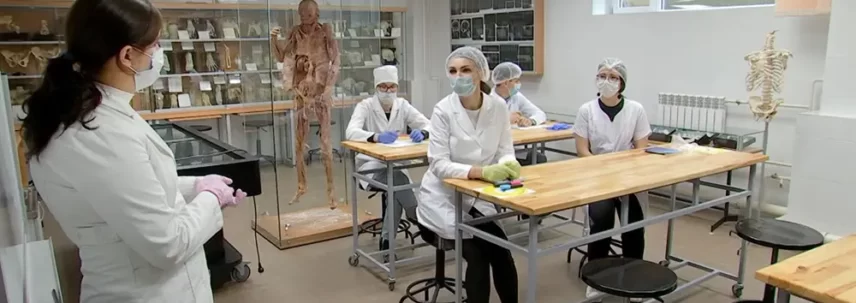
Every desiring student always dreamed of becoming a doctor, but the high tuition fees in Western countries made it seem impossible. While searching for affordable options, we got an affordable option for you that’s Russia—a country known for its long-standing reputation in medical education and globally recognized degrees.
Compared to the US, UK, or Australia, studying medicine in Russia offers a cost-effective path without compromising quality. Universities like Dagestan State Medical University provide top-tier education, modern facilities, and international recognition, making them an excellent choice for aspiring doctors.
In this article, we’ll compare the costs of studying medicine in Russia with other countries, highlight key benefits, and explain why choosing a Russian medical university could be the smartest decision for international students in 2025.
Getting into medical school is challenging no matter where you apply. In many countries, the intense competition and limited seats make it difficult for students to secure admission. The opportunity to study abroad not only increases their chances of becoming doctors but also provides exposure to diverse medical practices and global career opportunities.
Here’s why more students are considering Russia for their medical education.
While other top countries like Australia, the UK, USA, and major European countries are well-known choices, it’s time to consider how Russia stacks up against those for medical studies?
When it comes to reliability and affordability, Russia offers exceptional perks for international students pursuing a medical degree. Let’s break down the costs and compare them to other top study destinations.
Russia is known for its affordable medical programs while maintaining high education standards.
Medical studies in the US, UK, Australia, and Canada come with a significantly higher price tag:
Living costs vary significantly depending on the country and city, and international students must plan their budgets accordingly.
In major cities across these countries, students face higher living costs due to expensive housing and daily expenses:
While some European nations offer low-cost or even free tuition, overall expenses remain high due to living costs:
Tuition fees for medical programs in Russia range from 250,000 to 530,000 RUB per year, depending on the university and program. Compared to Western countries, this is a more affordable option for international students.
It depends on the program. Many universities offer English-taught medical courses, but learning Russian is beneficial, especially for clinical training in hospitals and daily life. Some universities also provide Russian language preparatory courses for international students.
Yes, Russian medical degrees are recognized globally. Many universities are accredited by the World Health Organization (WHO), ECFMG, and the Medical Council of various countries, including India, Pakistan, and the UK. However, graduates must pass licensing exams like USMLE, PLAB, or FMGE/NExT to practice in their home country.
The cost of living in Russia is relatively affordable. On average, students spend 25,000 – 35,000 RUB per month, covering accommodation, food, transportation, and other necessities. Costs may vary based on the city and lifestyle.
Yes, international students can work up to 20 hours per week during the academic term and full-time during holidays. However, you may need to obtain a work permit, depending on your visa type and employer’s requirements.
To apply for a Russian student visa, you need:
It is best to apply 6-9 months in advance. Most universities start their academic year in September, and the admission process usually begins in March or April. Early applications allow time for visa processing, accommodation arrangements, and other preparations.
No, typically there isn’t a standardized entrance exam required for international students seeking to study medicine (MBBS) in Russia
Essential items to bring include:
✔ Warm clothing (winters can be extremely cold)
✔ Personal hygiene and medical supplies
✔ Academic documents (passport, admission letter, certificates)
✔ Russian plug adapters & chargers
✔ A few personal items to make your dorm/apartment feel like home
You can start learning Russian through:
📌 Online courses (Duolingo, Babbel, Coursera)
📌 University language preparatory programs
📌 Basic Russian books or local language classes
Copyright 1992-2023 Dagestan State Medical University | General Medicine | MBBS | Dentistry | Pharmacy | Pediatrics | Nursing